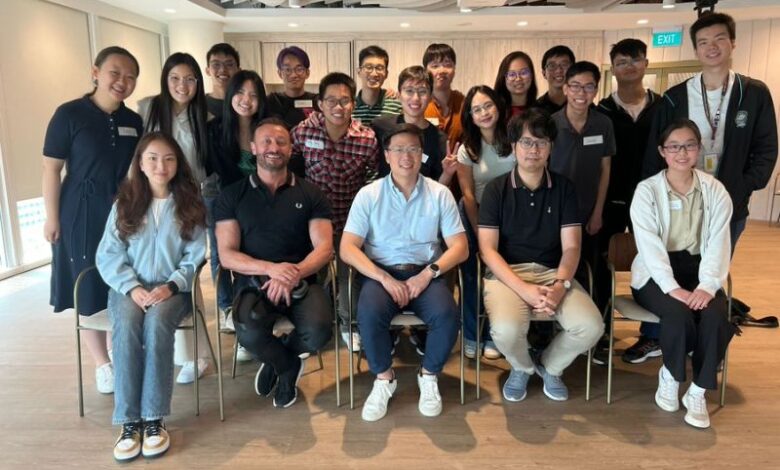Benson Lin’s Contributions at Optum and Case Western: A Collaborative Legacy

Introduction: Benson Lin and His Multifaceted Role in Healthcare and Academia
In the evolving landscape of healthcare, innovation and leadership are crucial in driving transformation. Individuals like Benson Lin have become key figures in shaping the future of healthcare systems. This article delves into Benson Lin’s contributions at Optum and Case Western Reserve University, where his expertise in healthcare technology and leadership has led to significant advancements.
Benson Lin’s role at Optum, one of the largest health services and innovation companies globally, and his academic affiliations with Case Western Reserve University highlight his commitment to improving healthcare delivery and research. Through his collaborative work, Lin has contributed to healthcare innovations that impact patient outcomes, data analytics, and systems management. This article explores the intersection of his roles at Optum and Case Western and how his work exemplifies a broader trend of collaboration between industry and academia in the healthcare sector.
Benson Lin’s Role at Optum: Healthcare Innovation and Data Analytics
At Optum, Benson Lin has focused on optimizing healthcare delivery by leveraging advanced technology and data analytics. Optum, a part of UnitedHealth Group, operates at the intersection of healthcare and technology, making Lin’s contributions vital to its mission.
Lin’s expertise in healthcare data analytics has enabled Optum to develop innovative tools for improving patient care and operational efficiency. By employing predictive analytics and machine learning, Lin’s teams have worked on algorithms that predict patient outcomes, identify high-risk populations, and streamline healthcare delivery. These innovations have not only helped Optum optimize costs but also improved patient satisfaction and health outcomes.
One notable initiative led by Lin involved integrating electronic health records (EHRs) with machine learning algorithms to enhance diagnostic accuracy. Through this project, Optum created a more cohesive data-sharing ecosystem that connected healthcare providers and patients in real time, reducing diagnoses errors and improving treatment efficacy.
Lin’s role at Optum also highlights his ability to navigate the complex landscape of healthcare regulations and policy. As the industry faces increasing demands for interoperability and data security, Lin’s work has focused on ensuring that the solutions developed by Optum meet stringent HIPAA requirements while also advancing healthcare innovations.
Key Contributions at Optum:
- Integration of EHRs with machine learning to improve diagnostic accuracy
- Development of predictive analytics tools for patient risk assessment
- Leadership in healthcare data analytics and operational efficiency improvements
- Ensuring regulatory compliance in healthcare innovations
For further reading on Optum’s innovations in healthcare technology, visit the Optum Official Site.
Academic Contributions at Case Western: Bridging the Gap Between Research and Industry
Benson Lin’s academic role at Case Western Reserve University has been equally impactful. As a leading figure in healthcare informatics, Lin has contributed to educational research that supports both theoretical and practical advancements in healthcare systems. Case Western’s commitment to fostering innovation aligns with Lin’s passion for improving healthcare outcomes through interdisciplinary approaches.
Lin’s research at Case Western has focused on healthcare systems engineering, which involves analyzing and optimizing the components of healthcare delivery systems. By using operations research techniques, Lin has helped develop models that enhance decision-making processes in hospitals and clinics, resulting in more efficient patient care pathways.
One of Lin’s significant contributions at Case Western has been in the field of telemedicine. Through collaborations with both students and faculty, Lin has explored how telehealth platforms can be better integrated into traditional healthcare settings. His research has shown that telemedicine not only improves access to care for remote populations but also enhances the overall efficiency of healthcare systems by reducing wait times and enabling real-time consultations.
Additionally, Lin has been a strong advocate for interdisciplinary collaboration in healthcare research. He has frequently brought together experts from fields such as computer science, engineering, and biomedicine to tackle complex healthcare problems. This collaborative approach has led to several research papers and grants aimed at improving healthcare delivery models.
Notable Research Contributions at Case Western:
- Healthcare systems engineering to optimize patient care pathways
- Telemedicine research focusing on integration into traditional healthcare systems
- Interdisciplinary collaborations across engineering, biomedicine, and healthcare informatics
- Contributions to academic papers and funded research initiatives
For more information on Case Western’s healthcare research programs, visit Case Western Reserve University.
Industry-Academia Collaboration: A Model for Future Healthcare Innovation
Benson Lin’s roles at both Optum and Case Western illustrate a growing trend in healthcare: the collaboration between industry and academia. Such partnerships are increasingly essential for addressing the complex challenges that healthcare systems face today, including cost management, patient access, and quality of care.
Lin has been at the forefront of several initiatives aimed at fostering these partnerships. At Optum, he has spearheaded collaborations with academic institutions to develop new healthcare solutions. Meanwhile, his academic role has enabled him to bring real-world industry challenges into the classroom, preparing the next generation of healthcare leaders to tackle these issues.
This collaboration between academia and industry is not just about developing new technologies; it’s about creating a feedback loop where research informs practice and practice, in turn, informs research. For example, Lin’s work on telemedicine at Case Western directly influenced the development of telehealth services at Optum, demonstrating how innovations can move fluidly between academic research and industry applications.
Furthermore, Lin’s leadership in fostering industry-academia collaborations has helped create a framework for sustainable healthcare innovation. By ensuring that research initiatives are aligned with healthcare providers’ needs, these collaborations lead to solutions that are not only technologically advanced but also practical and scalable.
Challenges and Future Directions
While Benson Lin’s work at Optum and Case Western has yielded significant advancements, the healthcare industry continues to face substantial challenges. One such challenge is the adoption of new technologies by healthcare providers who may be hesitant to shift from traditional practices. Lin’s efforts to demonstrate the value of data analytics and telemedicine are crucial in overcoming this barrier, but broader industry buy-in is needed.
Another challenge is ensuring the ethical use of healthcare data. As data becomes more integral to healthcare innovation, safeguarding patient privacy while allowing for the seamless exchange of information will be a critical focus for Lin and his peers. Innovations in blockchain technology and data encryption could help address these concerns.
Looking ahead, Lin is expected to continue his work on improving healthcare outcomes through technology, with a particular focus on expanding the use of AI in healthcare. His vision involves creating systems that not only predict patient outcomes but also provide personalized care pathways based on real-time data, setting a new standard for patient care.
Final Thought: The Lasting Impact of Benson Lin’s Work
Benson Lin’s contributions to both Optum and Case Western reflect a unique blend of technical expertise and strategic vision. By bridging the gap between healthcare providers, patients, and academia, Lin has helped push the boundaries of what is possible in healthcare innovation.
As the healthcare industry continues to evolve, the need for leaders like Lin—who can navigate the complexities of both research and practical application—will only become more apparent. His legacy will likely serve as a model for future healthcare leaders seeking to balance technological innovation with the realities of patient care and system management.
Frequently Asked Questions
What is Benson Lin’s role at Optum?
Benson Lin focuses on healthcare innovation, particularly in data analytics and technology integration at Optum, enhancing patient outcomes and operational efficiency.
How has Benson Lin contributed to Case Western?
At Case Western, Lin has led research in healthcare systems engineering and telemedicine, collaborating with interdisciplinary teams to improve healthcare delivery.
Why is the collaboration between industry and academia important in healthcare?
Collaborations like those led by Lin allow for the seamless integration of research and practical applications, leading to more effective and scalable healthcare innovations.
Sources:




